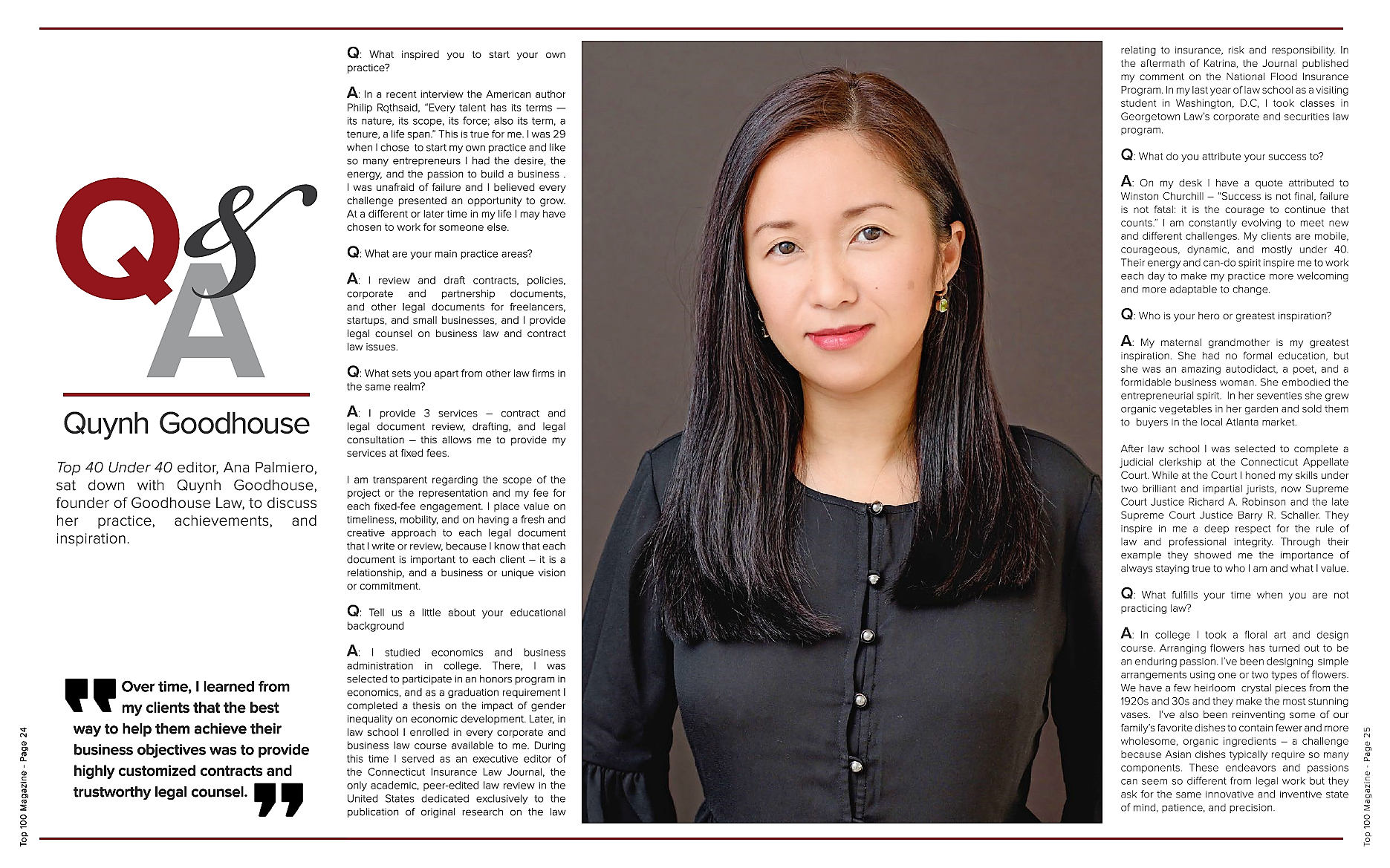"Top 40 Under 40 editor, Ana Palmiero, sat down with Quynh Goodhouse, founder of Goodhouse Law, to discuss her practice, achievements, and inspiration."
Q: What inspired you to start your own practice?
A: In a recent interview the American author Philip Roth said, “Every talent has its terms — its nature, its scope, its force; also its term, a tenure, a life span.” This is true for me. I was 29 when I chose to start my own practice and like so many entrepreneurs I had the desire, the energy, and the passion to build a business. I was unafraid of failure and I believed every challenge presented an opportunity to grow. At a different or later time in my life I may have chosen to work for someone else.
Q: What are your main practice areas?
A: I review and draft contracts, policies, corporate and partnership documents, and other legal documents for freelancers, startups, and small businesses, and I provide legal counsel on business law and contract law issues.
Q: What sets you apart from other law firms in the same realm?
A: I provide 3 services – contract and legal document review, drafting, and legal consultation – this allows me to provide my services at fixed fees.
I am transparent regarding the scope of the project or the representation and my fee for each fixed-fee engagement. I place value on timeliness, mobility, and on having a fresh and creative approach to each legal document that I write or review, because I know that each document is important to each client – it is a relationship, and a business or unique vision or commitment.
Q: Tell us a little about your educational background.
A: I studied economics and business administration in college. There, I was selected to participate in an honors program in economics, and as a graduation requirement I completed a thesis on the impact of gender inequality on economic development. Later, in law school I enrolled in every corporate and business law course available to me. During this time I served as an executive editor of the Connecticut Insurance Law Journal, the only academic, peer-edited law review in the United States dedicated exclusively to the publication of original research on the law relating to insurance, risk and responsibility. In the aftermath of Katrina, the Journal published my comment on the National Flood Insurance Program. In my last year of law school as a visiting student in Washington, D.C., I took classes in Georgetown Law’s corporate and securities law program.
Q: What do you attribute your success to?
A: On my desk I have a quote attributed to Winston Churchill – “Success is not final, failure is not fatal: it is the courage to continue that counts.” I am constantly evolving to meet new and different challenges. My clients are mobile, courageous, dynamic, and mostly under 40. Their energy and can-do spirit inspire me to work each day to make my practice more welcoming and more adaptable to change.
Q: Who is your hero or greatest inspiration?
A: My maternal grandmother is my greatest inspiration. She had no formal education, but she was an amazing autodidact, a poet, and a formidable business woman. She embodied the entrepreneurial spirit. In her seventies she grew organic vegetables in her garden and sold them to buyers in the local Atlanta market.
After law school I was selected to complete a judicial clerkship at the Connecticut Appellate Court. While at the Court I honed my skills under two brilliant and impartial jurists, now Supreme Court Justice Richard A. Robinson and the late Supreme Court Justice Barry R. Schaller. They inspire in me a deep respect for the rule of law and professional integrity. Through their example they showed me the importance of always staying true to who I am and what I value.
Q: What fulfills your time when you are not practicing law?
A: In college I took a floral art and design course. Arranging flowers has turned out to be an enduring passion. I’ve been designing simple arrangements using one or two types of flowers. We have a few heirloom crystal pieces from the 1920s and 30s and they make the most stunning vases. I’ve also been reinventing some of our family’s favorite dishes to contain fewer and more wholesome, organic ingredients – a challenge because Asian dishes typically require so many components. These endeavors and passions can seem so different from legal work but they ask for the same innovative and inventive state of mind, patience, and precision.

